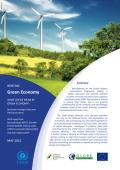This study forms part of the European Commission’s on-going analysis of the opportunities to be gained from improving resource efficiency and how best to help businesses realise the economic potential, as well as environmental and social benefit. The study has examined the main resource efficiency measures available to EU business using a top-down review of literature on resource efficiency together with a bottom-up review of industry data and examples from case studies. Preliminary conclusions on measures were validated through limited industry consultation with EU-based businesses. The scope for businesses to improve resource efficiency has been assessed and the opportunity to business quantified through a business lens as new estimates of direct economic benefits. This research provides a new economic perspective to complement other published studies, a better insight into the impact on businesses of policies and programmes on resource efficiency, and an understanding of the relative effectiveness of resource efficiency measures and of the measures which might best suit particular businesses or sectors of the economy.

Reinvigorated by the United Nations Environment Programme (UNEP), a global discussion and national activities on green economy transitions have regained momentum since 2008. The increase in interest is, among other things, due to the growing understanding of the similarity and interlinkages between many of the recent financial, economic, environmental and social crises.
The 2008 global financial crisis focused attention not only on the financial losses, and implications for economies, jobs and housing, but also raised questions as to the fundamental imbalance in our economies. The choice of capital allocation - investment in property, fossil fuels and financial assets, rather than in measures to encourage resource efficiency - has created destructive imbalances. A further common element to all these crises is the focus of decision making on short time horizons and trust in what has often proven to be an incomplete evidence base including a lack of proper accounting, for example as regards the cost of climate change and biodiversity.
This brief examines the reasons behind the current drive towards sustainable public procurement (SPP), and the barriers that have to be overcome in order to implement it. It also looks at the key benefits and methods involved in SPP and green public procurement (GPP). The author explains that a significant share of the world’s GDP is associated with expenditures by governments. On average, total public expenditures by central and local governments are estimated to account for about 20% of GDP in OECD countries, and roughly 15% in non-OECD countries.
Governments have increasingly become involved in making their procurement “greener” or more sustainable. While green procurement and sustainable procurement refer to different concepts, the underlying idea is the same: to use public procurement in order to achieve desirable environmental and, in the case of sustainable public procurement, social outcomes.
Reasons for engaging in GPP or SPP include:
The need for environmentally sustainable modes of production and a more efficient use of resources i.e. Green Industry, is becoming increasingly evident. This is especially so in the developing world, which has the unique opportunity of avoiding the environmental pitfalls that the developed world has fallen into in the course of its industrial development; it can use past experience to build a Green Industrial infrastructure at the very outset. This paper provides an insight into how an increased focus on Green Industry for sustainable industrial development in developing and transition countries can contribute to the attainment of global Sustainable Development (SD) objectives. The paper seeks to elaborate on the need for and value of approaches that target industry specifically, and to promote a more equitable access to the knowledge, technologies and production processes that are needed in developing and transition countries, in order to achieve SD there and elsewhere.
This report identifies the broad range of policy measures required by national or federal governments to promote and facilitate the greening of industries. It has been prepared as part of the United Nations Industrial Development Organization (UNIDO) Green Industry initiative, which focuses on ways that developing countries can green their industries and accelerate growth in their environmental goods and services sector. One of the key objectives of the initiative is assessing the effectiveness of governments in developing countries in supporting the greening of their industries through national strategies, policies and integrated governance structures.
